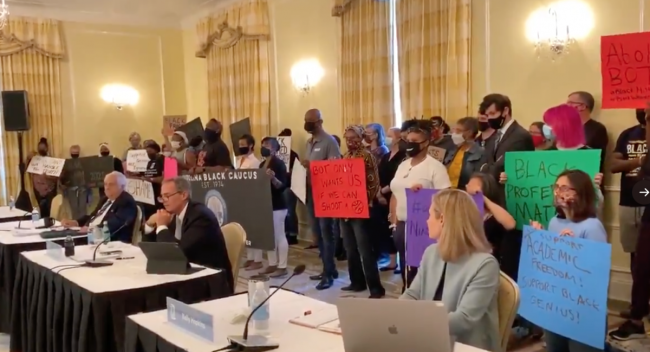You have /5 articles left.
Sign up for a free account or log in.

A protest in support of Nikole Hannah-Jones at UNC Chapel Hill's Board of Trustees meeting Thursday.
The University of North Carolina at Chapel Hill’s chancellor and Board of Trustees chair took questions from news media Thursday about journalist Nikole Hannah-Jones -- namely, about why she wasn’t granted tenure. But transparency was in short supply.
Part of the problem is that many details about university personnel actions are protected by privacy laws. The chancellor and board chair said that they were being unusually candid given the public interest in the case, however.
They also seemed to contradict themselves when explaining why Hannah-Jones was appointed to the Knight Chair in Race and Investigative Journalism without tenure, despite enthusiastic tenure recommendations and reviews from faculty members and external evaluators.
Richard Stevens, the board chair, said, for instance, that “neither the provost nor the chancellor ever presented any recommendation on this appointment to the board, nor did the board take any action on this appointment.”
Moments earlier, Stevens had said that the board’s university affairs committee was “charged with reviewing the provost’s recommendations” ahead of the January board meeting where Hannah-Jones’s tenure case stalled. The chair of that committee, Stevens said, contacted Provost Robert Blouin and asked for more time to consider Hannah-Jones as a tenure candidate. It was eventually agreed that she would be hired without tenure, with another tenure look to happen within five years.
How would the board have ever received Hannah-Jones’s name for consideration for tenure if the provost hadn't recommended her, as required by university policy? Asked this, Chancellor Kevin M. Guskiewicz said, “The recommendation comes through a process.” Faculty committees make a recommendation to the provost, he continued, "then the provost, based on the recommendation, can choose to move it forward to the trustees. In this case, as chair Stevens said, [Hannah-Jones] was moved forward in that process and put on the candidates to be considered for that January meeting."
Stevens and Guskiewicz did not share details about what concerns the board had regarding Hannah-Jones. Stevens said public pressure was not a factor in how the board dealt with her case. NC Policy Watch reported this week that an anonymous trustee said the board’s punting of Hannah-Jones’s tenure recommendation was about “politics.”
It’s unclear exactly what that means. But Hannah-Jones reports on the history of race and racism in the U.S., a provocative topic. Her Pulitzer Prize-winning “1619 Project,” published by The New York Times Magazine, was criticized by the Trump administration and other detractors as being unpatriotic or promoting a false narrative about American history and ideals. (The project required a clarification about the role of slavery in the Revolutionary War, but partisan criticism extends beyond that particular issue.) Hannah-Jones is also Black, and academe is strewn with accounts of people of color facing different standards for tenure than their white peers.
Stevens said he could not remember if Hannah-Jones was the only tenure candidate on a slate of candidates presented to the board in January who was not approved.
The news conference followed a scheduled trustees' meeting, where students, professors and some local community members protested in support of Hannah-Jones. No clear answers about the terms of her appointment were offered in that meeting, either.
Even the journalism faculty that Hannah-Jones is set to join in July has little insight as to why she won't have tenure, said Erin Siegal McIntyre, an assistant professor of journalism at Chapel Hill's Hussman School of Journalism and Media.
“All of us are trying to understand what happened at all levels. And I don't think anyone has a clear picture,” she said. “That said, it is also unclear whether Nikole will even be joining us after this fiasco. I personally hope that she will, given her track record and what she has to offer. And I know many of my colleagues, if not all of them, feel the same.”
It was not public knowledge, even within Hussman, that Hannah-Jones had not been granted tenure until Sunday. That’s when Dean Susan King published an edition of her regular newsletter saying that when presented with Hannah-Jones’s case, board members “did not act on tenure, and she was offered a five-year fixed term contract.” King said she was “told the board was worried about a non-academic entering the university with this designation.”
On Thursday, Stevens also said -- without offering additional details -- that “it’s not unusual” for board members to have questions about candidates' backgrounds, "particularly candidates that don’t come from a traditional, academic-type background.”
The board has tenured other nontraditional faculty candidates upon appointment, however, especially in professional fields such as journalism. All previous Knight chairs at Chapel Hill were hired with tenure. King noted this in her message about Hannah-Jones, saying, “The Knight Chairs were established, of course, to bring professionals to the academy and so this will have implications for our next Knight Chair search and appointment.”
Dr. Tom Linden, the Glaxo Wellcome Distinguished Professor of Medical Journalism, who was not a Knight chair, said he was tenured upon appointment in 1997 with no significant teaching experience and no Ph.D. (although he has a medical degree).
“It’s more than OK, it’s essential for a professor who teaches the practice of journalism to have had extensive experience in journalism, which is both an art and a craft, and a profession. If you haven’t worked as a journalist, how can you possibly teach someone else to be a journalist?” he said. Hannah-Jones earned her master's degree at Hussman.
Moreover, the benchmarks for “outstanding journalism tend to be awards, the most prestigious of which is the Pulitzer Prize, which Nikole Hannah-Jones won,” Linden said. “She received a MacArthur [Foundation] fellowship, as well, as a result of her outstanding work in the journalism field.”
Linden said that the board’s decision not to take any action on Hannah-Jones’s tenure recommendation was an “abdication of responsibility” on the part of trustees.
“It’s dishonest. These are public officials and public stewards who are acting in an unprofessional and nontransparent way that can only lead to grave mistrust of the institution, and that is a grave mistake,” he said. “That smacks of failed governance in an institution. That is an indictment of the institution.”









